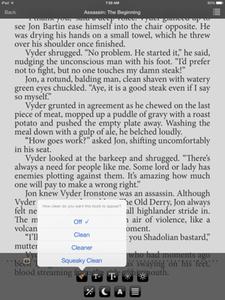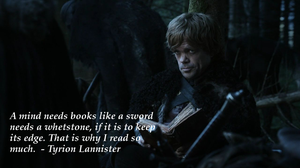I wasn't going to write about Clean Reader. Nope. I tried to forget. I really did. But then the good folks organizing Banned Books Week announced Wednesday that this year's focus will be on young adult titles. In recent years, the majority of challenged books have been in the YA category, including several on the recently released American Library Association's Top Ten Most Challenged Books of 2014 list.
And that's when I thought again about Jared and Kirsten Maughan's Clean Reader app, which they launched earlier this year after their daughter apparently came home from school complaining a library book she had read contained a few "swear words." Here's the pitch: "Prevent profanity in books from being displayed on your screen with Clean Reader; the only e-reader that gives you the power to hide swear words in any e-book. Simply select from three settings to determine how clean you want your books to appear. Clean Reader then scans your book and prevents offensive words and phrases from showing up on the screen as you read. Every time a swear word is blocked from display a less offensive alternative with the same general meaning can be displayed."
Here's the pitch: "Prevent profanity in books from being displayed on your screen with Clean Reader; the only e-reader that gives you the power to hide swear words in any e-book. Simply select from three settings to determine how clean you want your books to appear. Clean Reader then scans your book and prevents offensive words and phrases from showing up on the screen as you read. Every time a swear word is blocked from display a less offensive alternative with the same general meaning can be displayed."
Things got a little dicey almost immediately for the word-numbing startup, with many authors objecting to their books being tampered with. In a particularly scathing post on her blog, Joanne Harris wrote: "Anyone who works with words understands their power. Words, if used correctly, can achieve almost anything. To tamper with what is written--however much we may dislike certain words and phrases--is to embrace censorship."
By late March, @CleanReader was tweeting a slight change of course: "In response to authors wishes that we not sell their books, we have asked @pagefoundry to remove the bookstore from our app."
In the Los Angeles Times, David Ulin observed that he "was almost sorry" to see the developers remove books from their catalogue: "Not because I want my literature tampered with, but because the issues raised, about who owns a piece of writing, remain pressing and relevant."
When I first read about Clean Reader, I'll confess I thought it was a joke (like Dirty Reader, which "launched" on April Fool's Day with the slogan "Read Books, Enjoy Profanity!"), but the app also nudged me to consider what "control" means for us as readers. Do we really need more? We already have the upper hand when it comes to books because, well, we can read--or not read--whatever we choose to.
Beyond questions of text cleansing or copyright issues, Clean Reader prompted me to ask: Where the hell are we headed? For me, news stories about strange, redacting apps and seemingly endless YA book challenges evoke the dystopian vision of a future in which people will still be reading, but may only want to read about themselves. Why should reading be an escape from the narrow confines of your world when it can be a duplication of it? Why read at all? Why not just stand for hours staring into a mirror and telling yourself stories?
Selfie Lit, anyone?
"How much of this novel is based on your real life?" an author is being asked at this moment somewhere on the planet. It's sad to think that we might be heading toward a day when we can ask readers the same question.
When I was a bookseller, sometimes I offered this advice to customers: Make a quick list of all your personal data--age, sex, region, etc.--and then find novels that match absolutely none of those details. You are what you read is a much better motto than you only read what you are.  Last January, in the first flush of startup optimism, Clean Reader featured a curious deal on Twitter: "Game of Thrones 5 book bundle 50% off for the next 4 hours.... #GameOfThrones #cleanbooks." Even if the app does promise "the power to hide swear words," George R.R. Martin must have presented them with a challenge comparable to uniting the Seven Kingdoms.
Last January, in the first flush of startup optimism, Clean Reader featured a curious deal on Twitter: "Game of Thrones 5 book bundle 50% off for the next 4 hours.... #GameOfThrones #cleanbooks." Even if the app does promise "the power to hide swear words," George R.R. Martin must have presented them with a challenge comparable to uniting the Seven Kingdoms.
In fact, I'd say Tyrion Lannister nicely sums up my thoughts about the Clean Reader app: "My mind is my weapon. My brother has his sword, King Robert has his warhammer, and I have my mind... and a mind needs books as a sword needs a whetstone, if it is to keep its edge.... That's why I read so much." May all your expletives be undeleted. --Robert Gray, contributing editor (column archives available at Fresh Eyes Now)

